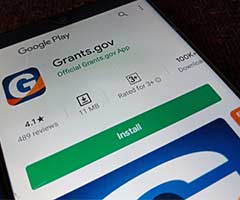 Many law enforcement and related agencies utilize grants to fund their programs. Grant funds are available through a variety of sources, including the federal government. Public sector grants generally consist of state and federal government bodies offering funds to government agencies, or local or state governments. Non-profit charitable organizations, such as family foundations or corporate foundations, may offer foundation grants. Police departments can apply for any of these grants by completing a grant proposal.
Many law enforcement and related agencies utilize grants to fund their programs. Grant funds are available through a variety of sources, including the federal government. Public sector grants generally consist of state and federal government bodies offering funds to government agencies, or local or state governments. Non-profit charitable organizations, such as family foundations or corporate foundations, may offer foundation grants. Police departments can apply for any of these grants by completing a grant proposal.
USDOJ
Bureau of Justice Assistance listings
Grants are an excellent source of funds for police departments beyond what is available within the agency’s operational budget. A grant can help bridge gaps between the department’s available resources and its needs including funding for vehicles, equipment, training or additional personnel. Many police departments use grants to solve community problems and fund important projects. Grants are becoming more common in the field of law enforcement as the need for alternative funding becomes a necessity for agencies across the country.
Grant writing can be a complex task that requires extensive research, access to relevant information and a distinct vision for how funding could benefit the department and community. Additionally, specific grant details need to be included in a grant proposal before it is submitted for consideration. CPI OpenFox offers information sharing solutions to the law enforcement industry that can aid in the complicated task of grant writing. Learn more about the grant writing process for police departments and how OpenFox® Product Suite by CPI OpenFox can help agencies write grant-winning proposals.
A grant refers to a financial award given by a local, state or federal entity to an individual or another entity for a specific purpose that is directly linked to public benefit. Grants differ from loans as they are not required to be paid back.
A grant proposal is defined as a formal, written request for funding to support a specific project or program. The specific content that a grant proposal should include is determined by guidelines published by the funding agency; however, most grant proposals include information that explains in full detail why the funds are needed, what the funds will be used for and how the funds will be managed.
Police departments must remember that this alternative funding is highly sought after by many law enforcement agencies making the grant writing process very competitive. Grant proposals are not guaranteed to receive funding as dozens, hundreds or even thousands of grant proposals may be submitted to an organization to compete for the same funds. To effectively compete for the funds, organizations must approach grant proposals with several goals in mind.
First, clearly convey to the reader how the funds will be used to better the requesting agency and/or their community. Next, the proposal should persuade the reader that the program or project is worthy of funding; this explanation is dependent on the purpose of the funding but should include the problem that the department is attempting to address, the chance of success with funding and how the agency will successfully manage the funds and achieve the department’s goals on schedule and within budget.
Finally, a grant proposal should answer any questions a reader may have about the program or project. Thoroughly explain the background of the situation that requires a solution and include sufficient details regarding the department’s plan for improvement. It is important that the proposal is informative, well-written and easy to understand.

For more information and resources on how to prepare a federal grant proposal, visit the Just Grants website.
Writing a grant proposal gives the law enforcement agency the opportunity to persuade the reader to provide financial support. Grants should be impactful and convey that the applicant has an important and well constructed plan and is capable of realizing that plan.
When planning and drafting a grant proposal, applicants should ask themselves the following questions:
 Police departments should not only consider their own vision and goals, but also those of the entity offering the grant. Think about who will be reading the proposal and their mission. Reflect on how their values align with that of the police department and present the plan in a way that positively influences the audience.
Police departments should not only consider their own vision and goals, but also those of the entity offering the grant. Think about who will be reading the proposal and their mission. Reflect on how their values align with that of the police department and present the plan in a way that positively influences the audience.
Also, consider what type of information will have the most impact on the audience. Some entities may want to see actual numbers pulled from recent data. Others may prefer seeing testimonials or recommendations that relate to the program or project and confirm how beneficial a grant would be for the department.
Although applicants have the freedom to include any information they deem relevant in their grant proposal, most granting organizations have certain requirements that applicants are required to meet. Ensuring that the proposal provides all mandatory information can drastically increase the odds of being awarded the grant.
Start by reviewing all available information regarding grant proposal requirements on the granting organization’s website or from other available resources. Next, study samples of successful proposals in the law enforcement field, including proposals that have previously received the grant for which the department is applying.
Granting organizations want to know that the entity they select to receive the grant is knowledgeable, capable and worthy of the funding. These organizations seek forward-thinking applicants that have done thorough research to support their claims and have established themselves as leaders in their industry.
If possible, reference past accomplishments that demonstrate the department’s ability to succeed and their commitment to their program or project. Also, mention any partnerships the department has formed with individuals or organizations that may help show the dedication and drive of the requesting department.
While an applicant may have good intentions, a grant proposal is not likely to be successful if poorly written. Structure the proposal in a way that can be easily understood with predictable sections labeled with clear headings. Grant proposals should be concise and to the point without flowery metaphors or filler content.
The readers should not have to work hard to determine what the applicant is trying to convey; write clear sentences using proper grammar and spelling. A memorable phrase, vivid imagery or a compelling anecdote can be used occasionally to make the proposal more engaging, as long as it directly reflects the importance and urgency of the project.
When writing a grant proposal, meet proper writing standards while also focusing on crafting quality content. Consider the following tips when writing grant proposals for police departments:
It should be clear from the beginning of the proposal what the department is trying to achieve and why funding is needed. Each section should have a main point, followed by supporting information that aligns with the section’s specific topic.
Avoid using complicated words or jargon when writing grant proposals. Instead, use clear language that is easy to read and understand.
Writing in an active voice allows the writer to make their writing more efficient and concise while using fewer words. It creates a faster-moving narrative, which makes the content more engaging.
If the proposal calls for certain keywords, or if they are mentioned in the funding organization’s goals or missions, try to include them throughout the proposal.
Grant proposals should never be generic. Instead, they should reflect the mission of the funding organization and respond to their unique interests and expectations.
Numbered lists or bullets can be useful in organization information, such as the main goals of the project or the stages of a plan.
Grant proposals should be written in a formal manner with professional language. Consider how a person would communicate to a supervisor or intelligent colleague in a professional setting.
Grant sponsors provide many resources such as checklists and reference materials applicants can use to review before submitting an application (more information on grants.gov). Additionally, certain grant sponsors provide their payment process information with valuable resources as well.

For more information on Federal Grants for law enforcement, visit Grants.gov.
 Streamline the grant proposal writing process with the use of safe and reliable law enforcement technology provided through OpenFox®. CPI OpenFox is a law enforcement information sharing product that provides a network for state and federal agencies to share and manage criminal data. The privately-held corporation delivers industry-leading software solutions to law enforcement and public safety agencies around the world.
Streamline the grant proposal writing process with the use of safe and reliable law enforcement technology provided through OpenFox®. CPI OpenFox is a law enforcement information sharing product that provides a network for state and federal agencies to share and manage criminal data. The privately-held corporation delivers industry-leading software solutions to law enforcement and public safety agencies around the world.
CPI OpenFox has served the law enforcement industry for more than 30 years and is dedicated to creating innovative solutions for increasing public safety and preventing dangerous situations. These solutions are currently used in over 30 states, by over half of U.S. law enforcement agencies and by eight federal agencies, including the U.S. Army, the U.S. Department of Justice (view DOJ grant details here) and the Department of Homeland Security (view DHS grant details here).

For more information on grant writing click below!
The Criminal Justice Information Services compliant OpenFox® product suite is one of the most robust and reliable technology platforms for secure law enforcement systems. This includes Complete Law Enforcement message transaction support which provides users with comprehensive access to national systems NCIC and NLETS. The OpenFox® Message Switch System contains a variety of useful features such as reporting, full recovery, guaranteed message delivery, logging, auditing, operations control and statistics.
Other OpenFox® products may also prove useful when writing grant proposals, such as the Criminal History Records Application tool, Messenger Workstation, Sex Offender Registry, HotFiles 2.0 and the Internet Records Access Portal (iRap). OpenFox® applications are available as a service or can be accessed via mobile device for optimal convenience and flexibility.
Many law enforcement agencies struggle to obtain the financing they need to meet critical goals. Grants can be an effective way to fund important missions without concern about how the money will be paid back. The grant proposal writing process is made easier with help from a law enforcement sharing product suite like OpenFox®. To learn more about this technological solution, reach out to CPI OpenFox today.